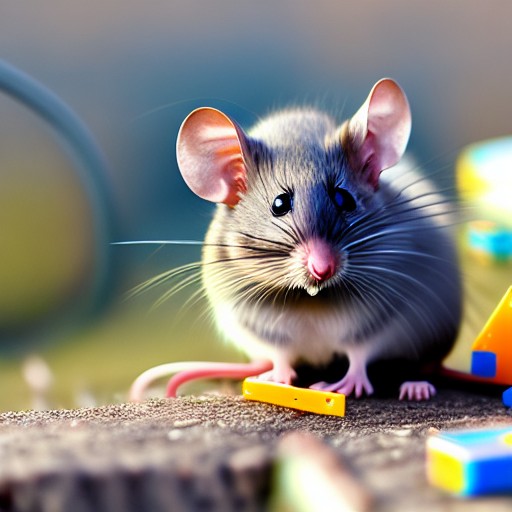As a homeowner, you may have experienced finding damaged items in your house caused by pests such as mice. One of the questions that may come to mind when this happens is whether or not mice can chew through plastic. In this article, we will explore this topic and provide you with some helpful information on the subject.
Mice are known for their ability to gnaw through various materials, which includes wood, paper, and even electrical wires. This can result in damage to your property, and in some cases, can even pose a risk to your health and safety. One common question that homeowners ask is whether or not mice can chew through plastic. This article will delve into that question. and provide you with some helpful information on how to prevent mice from damaging your plastic belongings.
Can mice chew through plastic?
Yes, mice can chew through plastic. Mice have powerful teeth that can gnaw through almost anything, including hard materials such as plastic. In fact, mice have been known to chew through plastic containers that hold food, water, and other items. If you have plastic items in your home, it is important to be aware that mice can chew through them and take appropriate steps to prevent this from happening.
Read Also: Can a mice die from cold?
Reasons why mice chew through plastic
There are several reasons why mice may chew through plastic. One reason is that they are looking for food or water. Mice are attracted to the smell of food and can easily detect it through plastic containers. They may also chew through plastic pipes in search of water.
Another reason why mice may chew through plastic is to create a nest. Mice will often shred plastic materials to make their nests more comfortable. They may also chew through plastic to create holes that allow them to enter and exit a space more easily.
Types of plastic that mice can and cannot chew through
Mice can chew through many types of plastic, but some are more resistant than others. Soft plastics, such as those used for trash bags or food packaging, are easier for mice to chew through. Hard plastics, such as PVC pipes or plastic toys, are more difficult for mice to gnaw through.
Dangers of mice chewing through plastic
When mice chew through plastic, they can create openings that allow other pests to enter your home. For example, mice may create a hole in a plastic container that allows cockroaches to enter and access the food inside. This can lead to a larger pest problem and can make it more difficult to get rid of pests in your home.
Mice chewing through plastic can also be a health hazard. If mice chew through plastic pipes, it can result in water leaks that can cause mold growth and water damage. If mice chew through plastic containers that hold food, it can contaminate the food and pose a risk to your health.
How to prevent mice from chewing through plastic
There are several steps you can take to prevent mice from chewing through plastic in your home. One of the most effective methods is to store food and other items in containers that are made from hard plastic, metal, or glass. These materials are more difficult for mice to chew through and will help protect your belongings from damage.
You can also seal any openings in your home that mice can use to enter. This includes sealing cracks in walls and floors, as well as installing door sweeps and weather stripping. This will make it more difficult for mice to access your home and will reduce the likelihood of them chewing through plastic items.
Another effective method is to use repellents or deterrents. There are several natural and commercial products available that can help repel mice. Some examples include peppermint oil, mothballs, and ultrasonic repellents.
Signs of mice infestation
If you suspect that you have a mouse infestation, there are several signs to look out for. These include:
- Mouse droppings: Small black or brown pellets that are found near food or nesting areas.
- Gnaw marks: Teeth marks on wood, plastic, and other materials.
- Nesting materials: Shredded paper, fabric, or plastic that mice use to create their nests.
- Scratching noises: Mice are active at night and can be heard scratching and running in walls and ceilings.
How to get rid of mice
If you have a mouse infestation, it is important to take steps to get rid of them as soon as possible. There are several methods that you can use to eliminate mice, including:
- Traps: There are several types of traps available, including snap traps, glue traps, and humane traps.
- Poison baits: Poison baits are effective but can be dangerous to humans and pets if not used correctly.
- Professional pest control: If you have a severe infestation, it may be necessary to hire a professional pest control company.
The importance of professional pest control
While there are many DIY methods available for getting rid of mice, professional pest control is often the most effective option. Pest control professionals have the experience and expertise needed to identify the source of the infestation and eliminate it safely and effectively.
Conclusion
In conclusion, mice can chew through plastic, which can result in damage to your property and pose a risk to your health. To prevent mice from chewing through plastic, it is important to store food and other items in hard plastic, metal, or glass containers, seal any openings in your home, and use repellents or deterrents. If you have a mouse infestation, it is important to take steps to get rid of them as soon as possible, and consider hiring a professional pest control company if necessary.
FAQs
- Can mice chew through hard plastic? Yes, mice can chew through hard plastic, but it is more difficult for them than soft plastics.
- What is the best material for storing food to prevent mice infestation? Hard plastic, metal, or glass containers are the best materials for storing food to prevent mice infestation.
- How do ultrasonic repellents work? Ultrasonic repellents emit high-frequency sound waves that are uncomfortable for mice, causing them to leave the area.
- How can I seal openings in my home to prevent mice from entering? You can use door sweeps, weather stripping, and sealant to seal openings in your home and prevent mice from entering.
- Is professional pest control necessary for a minor mouse infestation? While minor mouse infestations can often be eliminated using DIY methods, professional pest control may be necessary for severe infestations or recurring problems.











